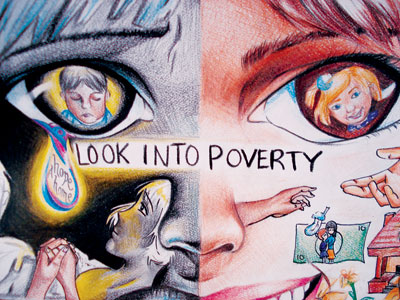All Nonfiction
- Bullying
- Books
- Academic
- Author Interviews
- Celebrity interviews
- College Articles
- College Essays
- Educator of the Year
- Heroes
- Interviews
- Memoir
- Personal Experience
- Sports
- Travel & Culture
All Opinions
- Bullying
- Current Events / Politics
- Discrimination
- Drugs / Alcohol / Smoking
- Entertainment / Celebrities
- Environment
- Love / Relationships
- Movies / Music / TV
- Pop Culture / Trends
- School / College
- Social Issues / Civics
- Spirituality / Religion
- Sports / Hobbies
All Hot Topics
- Bullying
- Community Service
- Environment
- Health
- Letters to the Editor
- Pride & Prejudice
- What Matters
- Back
Summer Guide
- Program Links
- Program Reviews
- Back
College Guide
- College Links
- College Reviews
- College Essays
- College Articles
- Back
Is Solving Poverty A Complex Task?
To the most elementary level, poverty describes a lack of money. There have been multiple efforts put in by the public to diminish such a complication. One such method includes college students putting up posters on college campuses for other people to view and become educated in this topic and possibly support in this endeavor to lessen poverty. Other methods have been to write petitions or donate leftovers to non-governmental organizations. While such efforts have been partially effective, they are not effective in eradicating this issue. One might think that the U.S. government is proposing strategic solutions to conquer this phenomena, but the government itself is “sluggish” in this concern. Many think that politicians are elected to solve problems and find new solutions, but most of those cultivated in the political field know that this is not there job, but that their only job is simply to get elected. While the U.S. government spends approximately 12 trillion dollars to fund programs that strive to effectively decrease poverty, the poverty rate has not even gotten close to falling below 10.5 percent. As of now, the United States faces a poverty rate of about 15.1 percent.
A study done recently show that there are 126 federal programs aimed at tackling this global issue. Although they sound promising, these programs fail because they are based on the guideline which says “the government can fix it all”. Such a complex issue as poverty would require a very thought out plan perhaps, would it not? According to a simple new-found solution, combating poverty is not that complicated after all. There are currently hundreds of millions of people globally who live in slums and receive less than perhaps one meal a day. Astounding evidence from experiments shows that poverty can be healed by a simple solution, giving money directly to the poor. Money handed out with no expectation of return by the giver raises the living standard of the person who receives the money, raises the total number of hours worked, and it increases labor productivity. These results are given to us by research and experiment carried out by Christopher Blattman of Columbia, Sebastian Martinez of the Inter-American Development Bank, and Nathan Fiala of the German Institute for Economic Research. This research was performed in Uganda’s northern poor section in the year 2008. Uganda’s government decided to provide an average yearly income of 381 dollars to every person from age 18 to 34. The youth were asked to only write a short statement explaining how they would spend the given currency and then they were given the money with no monitoring or any need for service to be provided back. Blattman, Fiala, and Martinez then surveyed the group of people who were give the money, and the results were interesting. Around 65 percent of these people decided, after four years of being given their share of currency, to work in skill-involved jobs such as metalworking, tailoring, and carpentry. The treatment saw a boost of 49 percent earning from after two years, and a 41 percent increase 4 years later.
This experiment is one of the simplest examples of economic growth that has ever been recorded. According to the results of this experiment, a theory suggests that the major cause of poverty is a lack of capital. The Ugandan experiment gives us a solution which is to not give currency to poor farmers and slum-dwellers at low interest rates, but provide free money to the youth so that they can put it into good use as they did in the experiment. Another experiment proves that this plan is effective by having a group of poor people being given free money. A handful of people involved in an experiment like this one in the United States stated that they worked 17 percent more hours than they did before. There are no doubts that such an effective program will not work in some conditions, for example prosperous countries with a large capital, but these results sound promising. The main moral of the story is, lessening a global problem such a poverty requires a simple job, giving money to more poor people.

Similar Articles
JOIN THE DISCUSSION
This article has 0 comments.

The goal of my work is to proove to people that many global issues such as poverty do not need a special plan to lessen these issues, but a simple ,effective task can do the more than enough.